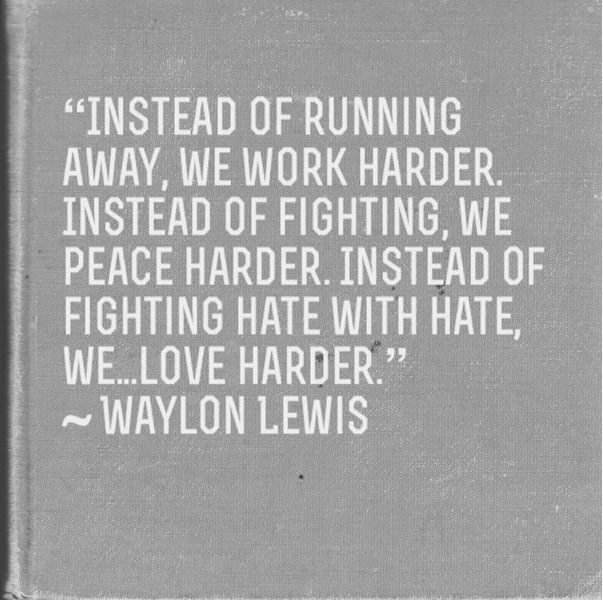My world views shouldn’t make me self-righteous.
Yet, during the weeks that followed Donald Trump being elected 45th President of the United States, I found myself to be entitled, haughty, and deeming myself higher than every single Trump supporter.
Trump voters: narrow-minded, arrogant, racist, sexist, antagonizing pigs—these were my actual thoughts. Vile judgments that coursed hatred through my brain and body. The boiling hatred twisted my heart, diminishing a sense of purpose and faith in the world—belittled, begotten.
But this time, I stopped. I looked at myself, my venomous hate; I was ashamed.
Was I any different than Trump?
How different was I from the people I had been judging cruelly? Boldly hating someone for being sexist mirrored the same emotions of a sexist hating me for being a bold woman.
There is unmovable hate on each side.
I realized, with agonizing self-study, that it was a moot point to fight with those attached passionately to their views, because, I, in turn, was immobile and attached to mine.
I believed, wholeheartedly, that my view of how life should be lived was the one correct view of life. That we should live lovingly, accept all race, sex, religion, culture and sexual preference.
Those who acted out of this accord, who presented their views differently, I instantly looked down upon. I presumed them terrible—not worth listening to.
I let their viewpoints boil my insides, while I judged them with crude remarks: “They’re so stupid. Oh, their ignorance.”
I watched a video of commentary from a conservative Tomi Lahren and laughed at disbelief, incredulous, thinking “who watches this? Who still thinks like this?”
But she has millions of followers. That’s a massive amount of people who agree that opinions of that sort are truth.
Smack. It hit. If I was attached and unmoved by listening to the degradation of the other side, what hate and judgement in my words made them want to change their views, or even listen to me?
It seems, you see, that both sides are stuck.
How can I judge a person for abusing their white privilege when they have no knowledge of its existence?
See, the more I thought about it, the more I saw it everywhere: in my friend’s posts, in daily conversation, in news. This full-fledged attachment to a viewpoint; the speaker conceptualizing that they wield the one correct way of living, and those who think differently are insignificant, are less.
Someone set to argue is not set to listen.
Someone can’t change unless they are willing to. Help can’t be received unless it’s asked for.
Shaming people for their perceived truth, shaming people for being a Trump voter isn’t going to change anything.
It’s just as effective as shaming someone for being homophobic or sexist.
There seems to be a divide that’s growing; there is a viewpoint that “Trump supporters” are gullible, hateful humans; those against Trump or Hillary Clinton supporters seem to be adopting a self-righteous attitude, close to bigotry.
Those that don’t have congruent world-views are shamed, belittled.
Isn’t that a form of persecution?
When Trump won the election, one of my first Facebook posts was along the lines of “We will teach Trump supporters how to love,”:
“Maybe, aye, just maybe this dark event is a small cloud blocking the sun. This dark event could be a good thing. Too long the wild spirits, the yogis, healers, lovers, equality activists, peaceful people have been divided; strong in our voice but weak in our impact. Americans, we are from a country where a majority are still racists, sexist, homophobic, un-accepting. Yet, something is different, we have something we didn’t have before: a reason to bind together, a little tighter, advocate peacefully, a little stronger. The peaceful have the ability to teach love and acceptance through our actions now, through the words we start spreading today. United, joined as one voice, we can stop action, we’ve seen it done in our history; and in contrast to the president the message will ring louder than before. Let’s show the people that voted for Trump: that respect, care, acceptance and honor are the majority; and we can be silent no longer.”
It was received very well, by like-minded individuals, but one woman commented that she saw the post as being hateful. Taken aback, I thought, how could it possibly be?
I saw it. With that last sentence I was perpetuating the divide, implying that Trump voters lacked honor or respect.
Going into the New Year, let’s let go of the notion that all Trump supporters are this prudent evil. Let’s stop dividing ourselves; it’s weakening.
Let’s let go of the notion that the world is divided into this crystal clear line of black and white, right and wrong.
In a twisted way, I’m thankful that Trump was elected president. Trump brings to light the severity of speaking without reflection, without thought. Twitter and other social media accounts make rampant the quick response that seems detrimental to society, to our minds. The negative effects of such are even more evident now than ever.
Hate is quickly spread, words quickly judged, in a click of a “like” or swift motion of an “un-follow”.
So often, we are quick to respond, acting on impulse and ingrained instinctive reactions. Post-election, in the blink of an eye, people were enraged enough to offer their seemingly correct perception and response, without taking a step back to contemplate, to reflect.
Instant judgement, slow arising empathy.
We all think we have all the answers, and we all think our way of viewing things is correct.
If we are jumping to argue our viewpoint we have already made the decision not to listen to the other side.
The Western world of instant-everything begs us to let go of contemplation, reflection on why some emotions might arise, when this is exactly what I, what we, need to be doing.
Anger is rampant. Yet, anger is a secondary emotion; always arising in result of an underlying emotion. What is our underlying emotion? Fear? Bemusement?
Are we taking into account our own attachment to ideals, perceived notions of right?
We are not made superior by our mere association to the notions of living we deem ideal or correct.
Yes, we can get behind the notion, that love, surely, is the proper way to live—but the idea isn’t “ours”. We are not made better by our ideas, but rather our actions.
What action are we taking that is inclusive and encourages others to think differently, openly?
What avenues of self-study are we offering, safely, that encourage everyone—not just those we don’t agree with—to really look at where they developed their ideologies?
I ask because I really want to know: how do you open up the doors to change ideology?
It’s logical that a woman will disagree with sexist notions, because we hit up against the barriers of this thought process every day. It’s logical that a homosexual will feel the barriers of living in a “straight” catered world. It’s logical that different races will feel the barriers of the privileges allowed to some, not all.
We only seem to start to understand something when we brush up against the negative effect of an idea, a dogma. A societal norm only hits us as unfair, unworthy when we, or someone we love, or empathize with is hit against its restrictions.
But how do you explain restriction to someone who has never felt it?
How do you explain something that is unjust? How do you explain shackles to someone who has never been imprisoned?
I’ve found empathy and understanding through stories: written, verbal, art or moving-picture. I’ve changed my perceptions, due to the affect of stories. I think, stories are what will invoke change.
Telling a story takes bravery. How can we support those who can tell their story?
How can I help you tell your story?
How can we share stories that invoke empathy without disseminating judgement?
Social media seems attacking, instead of inclusive. Deriding one end, while empowering another group. I ask: how can we take action to empower both ends of the spectrum, how do we empower both sides of the coin?
How can we explain privilege without undermining or degrading those who have it? How can we explain sexism to someone without insinuating those who think that way are evil?
Attacking one’s identity doesn’t seem a loving way to promote change. In fact, it seems to perpetuate a stronger divide and attachment to ideals. Here is an article I found helpful in explaining privilege without attacking.
I say thank you Donald Trump:
For bringing to light the sheer failure of our politics, and the chilling effects, once illustrated in William Shakespeare’s Julius Caesar; of mob mentality. How easily groups can be deceived. When we feel supported, we’ll believe anything.
“Drain the swamp. Funny how that term caught on, isn’t it? I tell everyone: I hated it! Somebody said, ‘Drain the swamp.’ I said, ‘Oh, that’s so hokey. That is so terrible.’ I said, ‘All right. I’ll try it.’ So like a month ago, I said, ‘Drain the swamp.’ The place went crazy. I said, ‘Whoa. Watch this.’ Then I said it again. Then I started saying it like I meant it, right? And then I said it, I started loving it”
Do we take the time for individual reflection? To ponder why we think the way we do? Or do we follow the cheers, the jeers?
I say thank you:
For bringing to light that racism is rampant, an issue that deserves our attention. And now, really is grabbing it. People are starting to stand up.
I say thank you:
For bringing to light that crude remarks about women are are not respected, for giving numerous women the strength to start to speak out against sexual violence. I feel the longer you are in office, the more of a discussion this will be, and I feel like change might happen here.
We are going into 2017 with the most unpopular president-elect in recent history. But, I see Trump as a lantern—a crude light, but light nonetheless—casting on the darkness that remained so well-hidden, barren beneath politeness. He has effectively shown the faults in our political system, and stagnant societal viewpoints that need to change.
I am thankful for the conversations that are arising and momentum that is gaining power.
I am thankful for the stories that need to be told. And the ears, that after this turmoil, are ready to listen.
Protect the vulnerable.
Share your story.
Speak.
We all stand together.
Author: Elizabeth Brumfield
Editor: Erin Lawson









Read 1 comment and reply